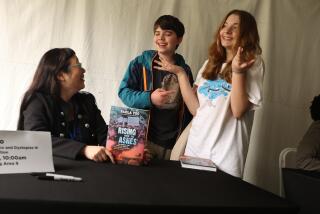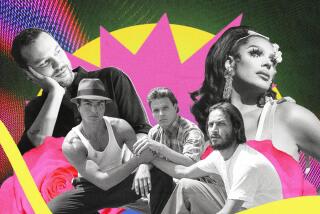Annual Hay Festival is one for the books
- Share via
The small market town of Hay, nestled on the border between England and Wales, is an unlikely setting for one of the world’s biggest book festivals. It has a population of less than 2,000, and the nearest train station is 30 miles away. Yet each year, during the last week of May and the first weekend in June, upward of 100,000 people descend on this tiny town to attend the Hay Festival, a literary extravaganza that is now firmly established as the biggest book event in Britain.
Bill Clinton dubbed Hay “the Woodstock of the mind” when he attended seven years ago. Among those who have gone are Arthur Miller (he famously asked, “Hay on Wye? Is that a type of sandwich?”), Norman Mailer, British Prime Minister Gordon Brown, Toni Morrison, John Updike, William Golding and Don DeLillo. Jonathan Coe once remarked that literature festivals are the closest that writers get to feeling like rock stars. It’s an appropriate parallel if only because rain and mud are as much a part of the festival as books and writers.
Indeed it’s hard not to reach for water metaphors when trying to describe the scenes at this year’s festival, where it rained -- seemingly without respite -- for seven days. I saw festival-goers pour out of tents, a tide of humanity rushing through the site. The ruddy-faced man forlornly trying to sell organic strawberries had little luck as a flock of umbrellas hurried past.
Christopher Hitchens, ever the contrarian, chose to dress in a pale linen suit that was almost pathologically inappropriate; he told me it was inspired by Graham Greene -- not “Our Man in Havana” but our man in Hay. The cottage where I stayed was a 10-minute walk from the festival site, and one day the road was so deep in water I had to borrow a friend’s bicycle which I rode unsteadily through the rain on my way home.
Given its remoteness, one might conclude that only a particularly British strain of masochism could persuade bibliophiles to come to Hay, but in fact it is precisely the unlikeliness of the location that makes the festival so glorious. Since there is nowhere else to go and nothing to do, an author is guaranteed a captive audience. The scarcity of accommodations means that you might be staying in the same hotel as one of the festival guests. Some years ago, Golding surprised fellow guests at his hotel by sleepwalking into their rooms late at night.
The man credited with fashioning Hay into a book town is Richard Booth, the self-styled King of Hay who in 1961 opened his first secondhand bookshop, shipping in hundreds of books from across the globe. Booth was convinced that a town full of bookstores could become an international attraction. “You buy books from all over the world,” he said, “and your customers come from all over the world.”
Driving into Hay these days, you are greeted by a sign that reads: “Hay, town of books.” It’s a reasonable claim to make, considering that Hay has 31 bookshops, one for every 61 residents. There are stores that specialize in children’s literature, cooking, travel and, of course, numerous secondhand shops.
The Hay Festival was the brainchild of the current festival director, Peter Florence, and his father, who, so legend has it, came up with the idea at their kitchen table, while wondering why there wasn’t more to do in Hay. The first festival was held in 1988; it was funded by the winnings of a poker game, and events were held at venues around town.
From these humble beginnings, Hay has grown: There are now satellite festivals in Spain and Colombia. The original brief event -- the Florences wanted only to invite their friends to the town to listen to their favorite writers -- has expanded to include not only writers but also politics, film, music and comedy. As the audience has developed, so has the wattage of the guests.
The great charm of the Hay Festival for an ordinary visitor is that it is purposefully democratic. Authors are not holed up in special VIP sections roped off from the general public; on the whole, they will be eating and drinking among the festival-goers. I spotted former Monty Python member Terry Jones in front of me in the line for a latte, and I sat next to British Cabinet member Ed Miliband while listening to Jimmy Carter.
Carter was one of the highlights of this year’s festival; Hay took him to its heart as it had earlier guests Clinton and Al Gore. Politically, the Hay audience tends to be progressive; attendees cheered Gore Vidal and John Irving and gave Carter a standing ovation. The festival also prides itself on being environmentally responsible; when Gore came, two years ago, he was criticized for flying to Hay to deliver his green message. The Guardian, which sponsors the festival (full disclosure: I write for the paper), had as its on-site base a house made from straw bales, with furniture made from recycled materials. It seemed a good idea until the rain began leaking through the straw roof, at which point some drastic and potentially environmentally unsound action had to be taken.
The festival does invite right-wing speakers -- if only to confirm the prejudices of the audience. The appearance of John Bolton, former U.S. ambassador to the United Nations, was criticized by some, and one leading environmentalist and columnist tried to rush the stage during Bolton’s talk to arrest him for war crimes. This “citizen’s arrest” was foiled by the intervention of two security guards, but it has already entered the annals of Hay myth.
At Hay, guests are as happy to be in the audience as onstage; this year, Christopher Hitchens went to hear Vidal, Carter went to see Gene Robinson and British Foreign Secretary David Miliband not only sat down to watch Shashi Tharoor but also was invited onstage to introduce and interview him.
The democratic nature of the festival also means that audience members can ask questions without the filter that journalists often interpose. During a question-and-answer session with Salman Rushdie, a young girl asked what his favorite book was. He told her it was “Alice in Wonderland.” I asked Martin Amis, whose latest book opines on Islam and its discontents, whether he actually knew any Muslims. His reply? “I know Salman Rushdie.”
Amis, like Hitchens and Ian McEwan, is a Hay regular. But often the most memorable moments involve people you would never expect to see at a literary festival. One afternoon, I found myself in the restaurant of the Swan Hotel playing chess with Boris Spassky, the legendary Russian grandmaster. Spassky was speaking at the festival -- nobody could tell me why exactly -- and had amused himself earlier in the day by playing 20 matches simultaneously in the Hay town center. “It was nothing,” he told me in heavily accented English. “It only gets hard when you play blindfolded.”
Spassky reflected on how different this Welsh town was from Leningrad as I pondered my next move. “I will kill you in two moves,” he muttered as his queen slashed across the board.
Playing chess against Spassky -- who had played Bobby Fischer in that legendary match in Reykjavik in 1972 -- sums up everything I love about this curious and compelling festival. I could try to explain it, but perhaps it’s most accurate to say, simply: “It happened at Hay.” *
Sarfraz Manzoor writes for the Guardian. He is the author of the memoir “Greetings From Bury Park.”
More to Read
Sign up for The Wild
We’ll help you find the best places to hike, bike and run, as well as the perfect silent spots for meditation and yoga.
You may occasionally receive promotional content from the Los Angeles Times.










